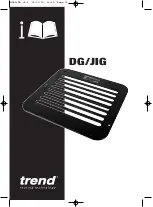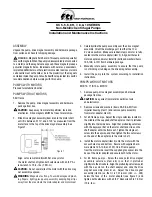
The speed of Model 800 is controlled by
rotating this dial to desired setting on dial.
Switch Setting
Speed Range
0
OFF Position
* 2
5,000 – 11,000 RPM
4
12,000 – 20,000 RPM
6
21,000 – 25,000 RPM
8
26,000 – 30,000 RPM
10
31,000 – 35,000 RPM
*2 is the maximum speed setting for wire
brushes.
-10-
Set the speed indicator to fit the job to
achieve the best job results when working
with differentmaterials.
To select the right speed for each job, use a
practice piece of material. Vary speed to
find the best speed for the accessory you
are using and the job to be done.
Your Cordless RotaryTool is equipped with a
variable speed control dial. To turn the tool
ON, rotate dial to desired number to select the
operating speed needed from 5,000 – 35,000
RPM. To turn tool OFF, rotate dial to the “0” off
position.
You can refer to the charts on page 12, 13,
and 14 to determine the proper speed, based
on the material being worked and the type of
accessory being used. These charts enable
you to select both the correct accessory and
the optimum speed at a glance.
NEEDS FOR SLOWER SPEEDS
Certain materials, however, (some plastics, for
example) require a relatively slow speed
because at high speed the friction of the tool
generates heat and causes the plastic to melt.
Most work is done at high speed on your
Cordless Rotary Tool. Lower speeds are
needed only for certain tasks.
Operating Speeds For Accessories
To aid you in determining the optimum
operational speed for different materials and
different accessories, we have constructed a
series of tables that appear on page 12, 13
and 14. By referring to these tables, you can
discover the recommended speeds for each
type of accessory. Look these tables over and
become familiar with them.
Ultimately, the best way to determine the
correct speed for work on any material is to
practice for a few minutes on a piece of scrap,
even after referring to the chart. You can
quickly learn that a slower or faster speed is
more effective just by observing what happens
as you make a pass or two at different speeds.
When working with plastic, for example, start
at a slow rate of speed and increase the speed
until you observe that the plastic is melting at
the point of contact. Then reduce the speed
slightly to get the optimum working speed.
Some rules of thumb in regard to speed:
1. Plastic and materials that melt at low
temperatures should be cut at low speeds.
2. Polishing, buffing and cleaning with a wire
brush must be done at speeds below
15,000 RPM to prevent damage to the
brush.
3. Wood should be cut at high speed.
4. Iron or steel should be cut at top speed if
using tungsten carbide accessory, but at
slower speeds if using high speed steel
cutters. If a high speed steel cutter starts to
chatter — this normally means it is running
too slow.
5. Aluminum, copper alloys, lead alloys, zinc
alloys and tin may be cut at various speeds,
depending on the type of cutting being
done. Use paraffin or other suitable
lubricant on the cutter to prevent the cut
material from adhering to the cutter teeth.
DM 2610945859 05-07 7/10/07 8:43 AM Page 10






































